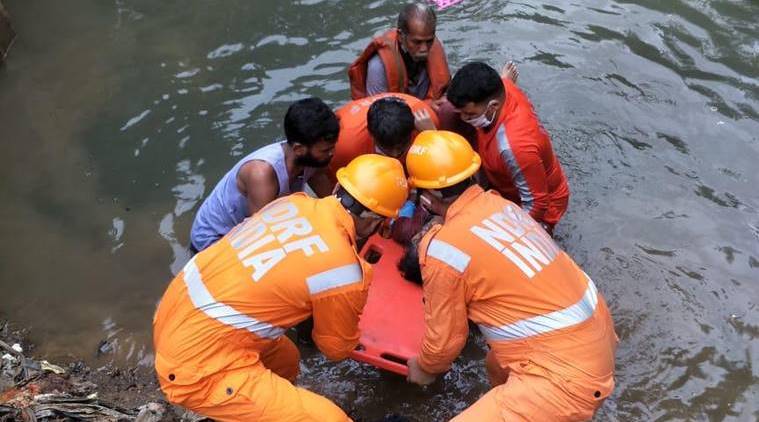 The 5th Battalion has deployed 15 teams in the western and coastal parts of Maharashtra and one team in Nagpur.
The 5th Battalion has deployed 15 teams in the western and coastal parts of Maharashtra and one team in Nagpur.
While conducting rescue operations, National Disaster Response Force (NDRF) teams are constantly in danger of catching Covid-19 infection or spreading it to those being rescued. In reaction to the Covid-19 pandemic, the NDRF has adopted a new Standard Operating Procedure (SOP) for all types of operations and brought in changes in daily routine, accommodation norms and special protective suits.
Sachchidanand Gawade, Deputy Commandant of the Pune-headquartered 5th Battalion of NDRF, which has deployed teams across the state, said, “While the risks of the Covid-19 pandemic will be there, we will have to conduct all types of operations, mainly floodwater and structure collapse, which unfortunately happen more during the monsoon. While one risk is the rescuer catching Covid-19 infection, the more serious concern is the rescuer causing the spread if infected and asymptomatic.”
He added, “For these challenges, we have devised new SOP since the beginning of the pandemic and have adopted new procedures and acquired special protective suits. When operating in high-risk areas, which is the case most of the time, our teams wear these suits. In low-risk areas, too, our teams wear full protective gear, including gloves and masks. On the rescue boats, we have reduced the number of people being transported in each trip, so physical distancing can be maintained. This will result in longer duration operations and more trips, but there is no option.”
The 5th Battalion has deployed 15 teams in the western and coastal parts of Maharashtra and one team in Nagpur. Eight teams have been deployed in Mumbai and its surrounding districts and six more in Kolhapur, Sangli and Satara districts, which had witnessed devastating floods last year.
The 5th Battalion has its station at Sudumbare near Talegaon Dabhade in Pune. It has a total strength of 18 teams comprising 45 members each. Till now, 60 Covid-19 cases have been reported among personnel of the battalion, all of whom have recovered.
Teams from the battalion have conducted multiple large operations in the recent past, including during Cyclone Amphan and the current intense spell of rains leading to flooding in many areas of the state. Since NDRF teams spend a lot of time in transit on road or military transport aircraft, officials said specific instructions have been issued on maintaining physical distancing norms. It is being ensured that facilities where NDRF teams are staying in deployment areas have adequate separate structures for isolation and quarantine, officials said.
Gawade said, “At the station headquarters, we have allocated buildings for isolation and quarantine. Every team that returns to station has to undergo 14 days of compulsory quarantine before even being able to meet families. During the quarantine, they are regularly screened and their health is monitored. We have also made some small changes – we shifted to herbal tea from simple tea, turmeric milk from simple milk, and more breathing exercises have been added to the routine.”
The NDRF has 12 Battalions consisting of 18 teams and more than 1,100 personnel each, stationed at various locations across the country. Each model team of the NDRF includes specialist search and rescue groups, comprising engineering, technical and electrical experts along with staff dog squads and paramedics. In cases where specific requirements arise, teams are reconfigured.